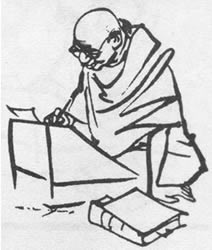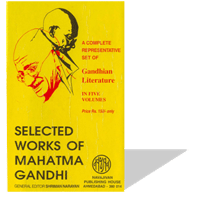
P.O. SEVAGRAM, DIST.WARDHA 442102, MS, INDIA. Phone: 91-7152-284753
FOUNDED BY MAHATMA GANDHI IN 1936
SECTION I : Selected Letters
[ from Selected Works of Mahatma Gandhi : Vol - 4 ]

SELECTED LETTERS
from
Selected Works of Mahatma Gandhi
Volume IV
Table of Contents
- Foreword
- Publisher's Note
SECTION I : LETTERS
- 1. To Dadabhai Naoroji
- 2. To G. K. Gokhale
- 3. To G. K. Gokhale
- 4. To Tolstoy
- 4A. From Count Leo Tolstoy
- 5. To Count Leo Tolstoy
- 6. To Leo Tolstoy
- 6A. From Count Leo Tolstoy
- 7. To Leo Tolstoy
- 7A. From Count Leo Tolstoy
- 8. To Maganlal Gandhi
- 9. To Maganlal Gandhi
- 10. To Narhar Shabhurao Bhave
- 11. To Mr Maffey, Private secretary To Viceroy
- 12. To W. B. Heycock
- 13. To Shankarlal on Ideas About Satyagraha
- 14. To Vinoba Bhave
- 15. To C F Andrews
- 16. To C F Andrews
- 17. To C F Andrews
- 18. To Kasturba Gandhi
- 19. To Kishorelal Mashruwala
- 20. To Sarojini Naidu
- 21. To Srinivas Sastri
- 22. To Srinivas Sastri
- 23. To Rabindranath Tagore
- 23A. From Rabindranath Tagore
- 24. To Rabindranath Tagore
- 25. From Rabindranath Tagore
- 25A. To Rabindranath Tagore
- 26. From Rabindranath Tagore
- 26A. To Rabindranath Tagore
- 27. To Rabindranath Tagore
- 28. To Rabindranath Tagore
- 29. To Rabindranath Tagore
- 30. To Rabindranath Tagore
- 31. To Rabindranath Tagore
- 32. From Rabindranath Tagore
- 32A. To Rabindranath Tagore
- 33. From G S Arundale
- 33A. To G S Arundale
- 34. To Every Englishman In India
- 35. To Viceroy
- 36. To Jawaharlal Nehru
- 37. To Jawaharlal Nehru
- 38. To Jawaharlal Nehru
- 39. To Jawaharlal Nehru
- 40. From Jawaharlal Nehru
- 41. To Jawaharlal Nehru
- 42. To Konda Venkatappayya
- 43. To T Prakasam
- 44. To Hakim Ajmal Khan
- 45. To Jamnalal Bajaj
- 46. To Mohomed Ali
- 47. To Motilal Nehru
- 48. To Motilal Nehru
- 49. To C Rajagopalachari
- 50. To C Rajagopalachari
- 51. To Kakasaheb Kalelkar
- 52. To A Friend
- 53. From Madeleine Slade or Miraben
- 53A. To Madeleine Slade
- 54. To Romain Rolland
- 55. To Romain Rolland
- 56. To Shri Shankaran
- 57. To Hermann Kallenbach
- 58. To Gulzarilal Nanda
- 59. To Dr Kailas Nath Kaju
- 60. To Dhan Gopal Mukherjee
- 61. To Henry S Salt
- 62. To The Viceroy
- 63. To Lord Irwin
- 64. To Reginald Reynolds
- 65. To Richard B Gregg
- 66. To Sir Samuel Hoare
- 67. To Ramsay MacDonald
- 68. To Pandit Malaviyaji
- 69. To The Secretary To The Government of Bombay, (Home Dept.), Poona
- 70. To Sir Tej Bahadur Sapru
- 71. To Carl Heath
- 72. To Carl Heath
- 73. To Carl Heath
- 74. To M A Jinnah
- 75. To M A Jinnah
- 76. To M A Jinnah
- 76A. From M A Jinnah
- 77. To M A Jinnah
- 78. From Subhash Chandra Bose
- 78A. To Subhash Chandra Bose
- 79. To Herr Hitler
- 80. To Every Briton
- 81. To Every Briton
- 82. To Generalissimo Chiang Kai-Shek
- 83. To Every Japanese
- 84. To American Friends
- 85. To Lord Linlithgow
- 86. To Lord Linlithgow
- 86A. From Lord Linlithgow
- 87. To Lord Linlithgow
- 87A. From Lord Linlithgow
- 88. To Lord Linlithgow
- 88A. From Lord Linlithgow
- 89. To Lord Linlithgow
- 90. To Agatha Harrison
- 91. To Winston Churchill
- 92. To Shriman Narayan
- 93. To Lord Pethick Lawrence
- 94. To Sardar Vallabhbhai Patel
- 95. To The Viceroy
- 96. To The Viceroy
- 96A. From Lord Mountbatten
- 97. To Abdul Ghaffar Khan
- 97A. From Abdul Ghaffar Khan
- 98. To A Friend
- 99. To Madame Edmond Privat
- 100. To The People of Gujarat
- Appendix I: Who Should Be Provincial Governors?
- Appendix II: A Psychological Explanation
- Appendix III: The Gandhian Constitutions for Free India
SECTION II : EXTRACTS FROM LETTERS
- Faith in God
- Religions and Scriptures
- Value of Prayer
- Truth and Non-violence
- The Science of Satyagraha
- Fasting in Satyagraha
- Unto This Last
- Khadi and Village Industry
- East and West
- Hindu-Muslim Unity
- Upliftment of Women
- The Good of All
- India's Freedom
- Education
- Caste System and Untouchability
- Brahmacharya
- Fearlessness
- Health and Hygene
- Self-restraint
- Self-development
- Selfless Service
- Voluntary Poverty
About This Volumes

Selected Works of Mahatma Gandhi comprises of Five volumes.
- Vol-I: Autobiography
- Vol-II: Satyagraha in South Africa
- Vol-III: Basic Works
- Ethical Religion
- Unto This Last
- Hind Swaraj or Indian Home Rule
- From Yeravada Mandir
- Discourses on the Gita
- Constructive Programme
- Key to Health
- Vol-IV: Selected Letters
- Vol-V: Voice of Truth
This book, Selected Letters, is volume-4.
Written by : M. K. Gandhi
General Editor : Shriman Narayan
Volume
Selected Works of Mahatma Gandhi : A set of five books
ISBN: 81-7229-278-3 (set)
Printed and Published by :
Jitendra T. Desai
Navajivan Mudranalaya,
Ahemadabad-380014
India
© Navajivan Trust, 1968
Download
Gandhi Letter 78A : To Subhash Chandra Bose
Birla House,
New Delhi,
2-4-1939
MY DEAR SUBHASH,
I have yours of 31st March as also the previous one. You are quite
frank and I like your letters for the clear enunciation of your views.
The views you express seem to me to be so diametrically opposed to
those of the others and my own that I do not see any possibility of
bridging them. I think that such school of thought should be able
to put forth its views before the country without any mixture. And
if this is honestly done, I do not see why there should be any bitterness
ending in civil war.
What is wrong is not the differences between us but loss of mutual
respect and trust. This will be remedied by time which is the best
healer. If there is real non-violence in us, there can be no civil
war much less bitterness.
Taking all things into consideration, I am of opinion that you should
at once form your own Cabinet fully representing your views. Formulate
your programme definitely and put it before the forthcoming A.I.C.C.
If the Committee accepts the programme all will be plain- sailing
and you should be enabled to prosecute it unhampered by the minority.
If on the other hand your programme is not accepted you should resign
and let the Committee choose its President. And you will be free to
educate the country along your own lines. I tender this advice irrespective
of Pandit Pant's resolution.
My prestige does not count. It has an independent value of its own.
When my motive is suspected or my policy or programme rejected by
the country, the prestige must go. India will rise and fall by the
quality of the sum-total of her many millions. Individuals, however
high they may be, are of no account except in so far as they represent
the many millions. Therefore let us rule it out of consideration.
I wholly dissent from your view that the country has been never so
non-violent as now. I smell violence in the air I breath. But the
violence has put on a subtle form. Our mutual distrust is a bad form
of violence. The widening gulf between Hindus and Mussalmans points
to the same thing. I can give further illustrations.
We seem to differ as to the amount of corruption in the Congress.
My impression is that it is on the increase. I have been pleading
for the past many months for a thorough scrutiny.
In these circumstances I see no atmosphere of non¬violent mass
action. An ultimatum without effective sanction is worse than useless.
But as I have told you I am an old man perhaps growing timid and over-cautious
and you have youth before you and reckless optimism born of youth.
I hope you are right. I am wrong. I have the firm belief that the
Congress as it is today cannot deliver the goods, cannot offer civil
disobedience worth the name. Therefore if your prognosis is right,
I am a back number and played out as the generalissimo of Satyagraha.
I am glad you have mentioned the little Rajkot affair. It brings into
prominent relief the different angles from which we look at things.
I have nothing to repent of in the steps I have taken in connection
with it. I feel that it has great national importance. I have not
stopped civil disobedience in the other States for the sake of Rajkot.
But Rajkot opened my eyes. It showed me the way. I am not in Delhi
for my health. I am reluctantly in Delhi awaiting the Chief Justice's
decision. I hold it to be my duty to be in Delhi till the steps to
be taken in due fulfilment of the Viceroy's declaration in his last
wire to me are finally taken. I may not run any risk. If I invited
the Paramount Power to do its duty, I was bound to be in Delhi to
see that the duty was fully performed. I saw nothing wrong in the
Chief Justice being appointed the interpreter of the document whose
meaning was put in doubt by the Thakor Sahib. By the way, Sir Maurice
will examine the document not in his capacity as Chief Justice but
as a trained jurist trusted by the Viceroy. By accept¬ing the
Viceroy's nominee as Judge, I fancy I have shown both wisdom and grace
and what is more important I have increased the Viceregal responsibility
in the matter.
Though we have discussed sharp differences of opinion between us,
I-am quite sure that our private relations will not suffer in the
least. If they are from the heart, as I believe they are, they will
bear the strain of these differences.
Love,
BAPU
Netaji Subhash Chandra Bose, p. 62-65